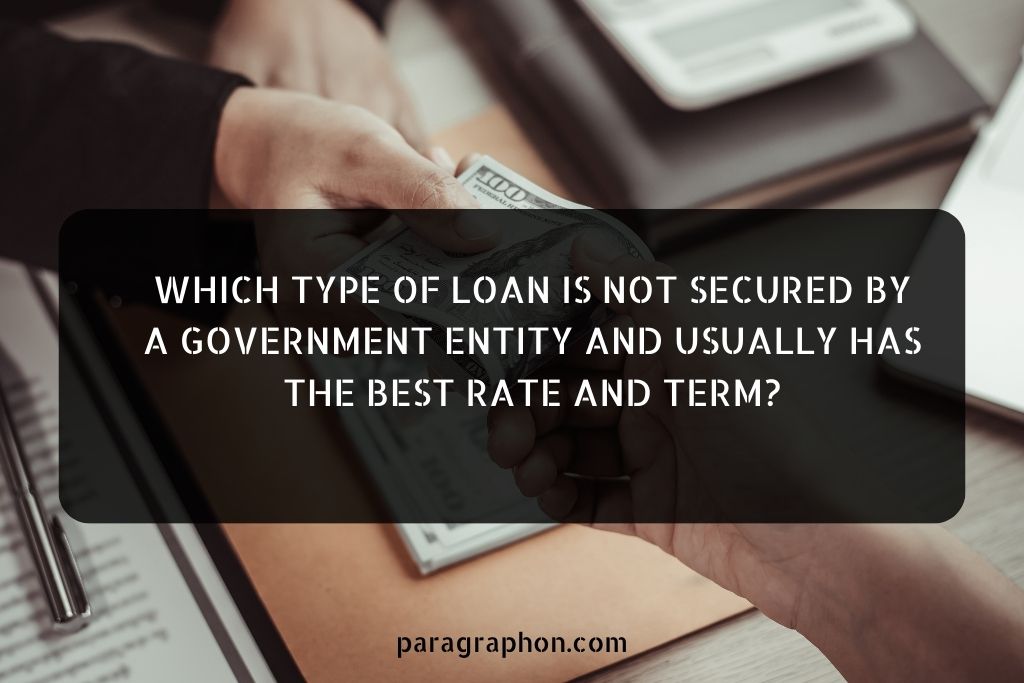When entering the realm of borrowing, navigating the financial landscape can seem quite daunting. The myriad types of loans available each come with distinct terms, conditions, and interest rates. Among these, unsecured loans emerge as a noteworthy category, distinguished by their unique characteristics. In this comprehensive exploration, we will unravel the intricacies of unsecured loans, a type not backed by a government entity, often featuring favorable rates and terms. Delving into what sets them apart, we’ll discern why they might be the optimal choice for you and conduct a comparative analysis with other loan types. Join us on this journey to gain a nuanced understanding of unsecured loans and which type of loan is not secured by a government entity and usually has the good rate and term, empowering you to make informed financial decisions in the ever-evolving borrowing landscape.
Understanding Unsecured Loans
Unsecured loans stand out in the loan family. Unlike secured loans that ask for something valuable, like your car or home, as a safety net, unsecured loans don’t need you to pledge any assets. Instead, they look at your creditworthiness, financial track record, and how capable you are of repaying the money. Since there’s no collateral involved, the lender checks your credit score and income to figure out if you can get the loan. It’s like borrowing trust, and if the lender thinks you’re reliable, you might qualify for the loan without needing to put up any prized possessions as a promise.
Common Types of Unsecured Loans
- Personal Loans: Personal loans are perhaps the most well-known type of unsecured loan. These loans have a broad range of applications, from covering unexpected medical expenses to consolidating high-interest debt. The flexibility of personal loans makes them a popular choice for borrowers seeking financial assistance without the need for collateral.
- Credit Cards: Credit cards are another basic form of unsecured credit. When you use your credit card to make a purchase, you’re essentially borrowing money from the credit card company. The repayment terms are flexible, and you have the option to pay off the balance over time, though interest will accrue on any unpaid amounts.
- Student Loans: Student loans are often unsecured and are intended to help finance education expenses. These loans typically offer favorable terms for students, such as deferred payments until after graduation, making them an attractive option for those pursuing higher education.
Advantages of Unsecured Loans
Now that we’ve covered the basics, let’s explore the advantages that unsecured loans bring to the table:
- No Collateral Required: The most apparent advantage of unsecured loans is that you don’t have to put up any collateral. This means you won’t risk losing your home, car, or other assets if you face difficulties repaying the loan.
- Quick Approval: Since unsecured loans don’t involve the lengthy process of appraising collateral, they often have a faster approval process. If you’re in urgent need of funds, an unsecured loan might be a quicker solution compared to secured loans.
- Versatility: Unsecured loans offer versatility in how you use the borrowed funds. Whether you need to cover medical bills, consolidate debt, or take a dream vacation, the choice is yours. This flexibility is a significant advantage for borrowers.
- Accessible to a Broader Audience: While secured loans may require a higher credit score and significant assets, unsecured loans are generally more accessible to a broader audience. This inclusivity makes them a viable option for individuals with good credit but limited assets.
Interest Rates and Terms
Now, let’s address the burning question: which type of loan is not secured by a government entity and usually has the good rate and term? Unsecured loans, in general, may have higher interest rates compared to secured loans, primarily because the lender takes on more risk without the security of collateral. However, within the realm of unsecured loans, some factors can influence the interest rates and terms.
- Credit Score: YThe interest rate is significantly influenced by your credit score you’ll be offered. Generally, individuals with higher credit scores are deemed less risky by lenders and may qualify for lower interest rates.
- Income Stability: Lenders also consider your income stability. A steady income reassures them that you have the financial means to repay the loan. This can positively impact the interest rate and terms offered to you.
- Loan Amount and Term: The amount you’re looking to borrow and the repayment term can influence the interest rate. Smaller loan amounts and shorter terms may come with more favorable rates, as they pose less risk to the lender.
Conclusion
In the complex world of borrowing, unsecured loans shine as a versatile and accessible option. While they may not be secured by a government entity, their advantages, such as quick approval, no collateral requirement, and versatility, make them a compelling choice for many borrowers.
When considering an unsecured loan, it’s essential to be mindful of your credit score, income stability, and the specific terms offered by lenders. By understanding these factors, you can navigate the lending landscape more confidently and make informed decisions about which type of loan aligns nicely with your financial goals.
In summary, unsecured loans empower individuals to access funds without pledging assets, providing a valuable solution for various financial needs. So, whether you’re planning a home renovation, covering unexpected expenses, or consolidating debt, unsecured loans might just be the key to unlocking your financial goals.
Frequently Asked Questions
What makes a loan “unsecured,” and how does it differ from secured loans?
Unsecured loans lack government backing and don’t need collateral, unlike secured loans that require assets like a car or home for security.
Why do unsecured loans often have better rates and terms?
Unsecured loans may offer better rates and terms because they assess creditworthiness and financial history rather than relying on collateral, making them more accessible to borrowers with a strong credit score.
How does my credit score and income impact my eligibility for an unsecured loan?
Your credit score and income significantly influence your eligibility for an unsecured loan. Lenders use these factors to determine your ability to repay without the safety net of collateral, favoring applicants with a higher credit score and stable income.





